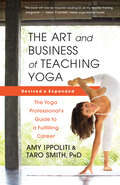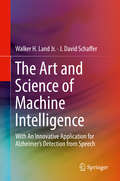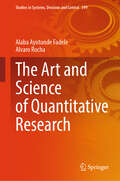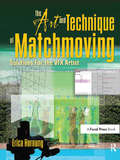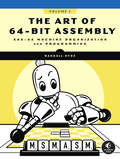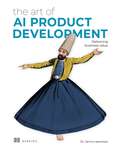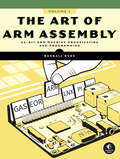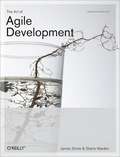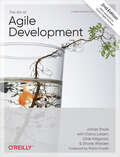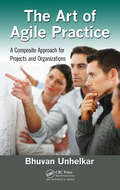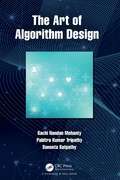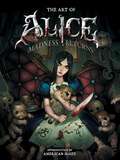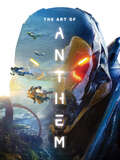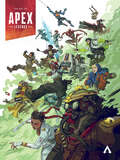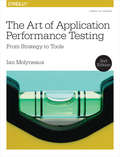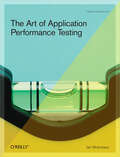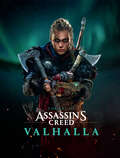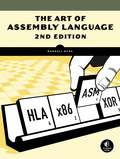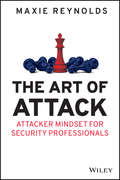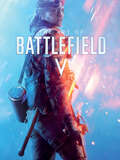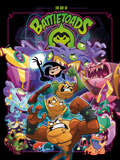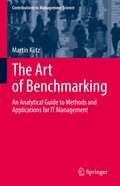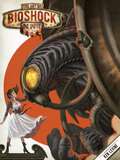- Table View
- List View
The Art and Business of Teaching Yoga (revised): The Yoga Professional’s Guide to a Fulfilling Career
by Amy Ippoliti Taro SmithOriginally published in 2016, The Art and Business of Teaching Yoga immediately became the essential resource for those looking to start or maintain a successful career in yoga. Since then, the landscape has changed. Online yoga and social media are now a crucial part of most teachers’ repertoires. Yoga teachers also face broad cultural shifts, an evolving environmental crisis, and resulting anxiety among students, all of which bring fresh challenges to their leadership and teaching abilities. This expanded edition will help you:• plan dynamic classes, including engaging digital content• build a loyal student base and become more financially stable• optimize your own practice• maintain a marketing plan and develop a unique brand• teach yoga to facilitate ease and inspire creative action in a troubled world
The Art and Science of Machine Intelligence: With An Innovative Application for Alzheimer’s Detection from Speech
by J. David Schaffer Walker H. Land Jr.This volume presents several machine intelligence technologies, developed over recent decades, and illustrates how they can be combined in application. One application, the detection of dementia from patterns in speech, is used throughout to illustrate these combinations. This application is a classic stationary pattern detection task, so readers may easily see how these combinations can be applied to other similar tasks. The expositions of the methods are supported by the basic theory they rest upon, and their application is clearly illustrated. The book’s goal is to allow readers to select one or more of these methods to quickly apply to their own tasks.Includes a variety of machine intelligent technologies and illustrates how they can work togetherShows evolutionary feature subset selection combined with support vector machines and multiple classifiers combinedIncludes a running case study on intelligent processing relating to Alzheimer’s / dementia detection, in addition to several applications of the machine hybrid algorithms
The Art and Science of Quantitative Research (Studies in Systems, Decision and Control #599)
by Alvaro Rocha Alaba Ayotunde FadeleThis book reflects on the insights gained from exploring the key dimensions of quantitative research as outlined in the preceding chapters. Quantitative research, with its emphasis on objectivity, systematic methodologies, and statistical rigor, plays a pivotal role in advancing knowledge across diverse fields. The study began with an introduction to its foundational principles, highlighting its distinct characteristics and relevance. Key conclusions drawn from each chapter are summarized below:In the first chapter, a basic knowledge of quantitative research was presented, with an emphasis on the methodical and organized approach that quantitative research takes to the study of observable events. Quantitative research differs from qualitative research in that it focuses on numerical data, statistical analysis, and objective findings, as opposed to qualitative research, which investigates subjective experiences and meanings. This contrast highlights the crucial role that quantitative approaches play in hypothesis testing and predictive analysis, which makes them very beneficial for academic subjects that need empirical data and findings that can be replicated from experiment to experiment. In the next chapter, we delved further into the fundamental aspects of quantitative research, including its dependence on organized instruments (such as surveys and experiments), the significance of operationalizing variables, and the pursuit of results that can be generalized. When it comes to answering problems that need accuracy, scalability, and statistical validity, quantitative research is an indispensable tool because of these inherent characteristics. At the same time, the chapter brought attention to the attitude of the researcher, which includes taking an objective perspective, reducing prejudice, and adhering to ethical norms. This frame of mind is very necessary in order to guarantee the honesty and dependability of the findings of the investigation.
The Art and Technique of Matchmoving: Solutions for the VFX Artist
by Erica HornungMatchmoving has become a standard visual effects procedure for almost every situation where live action materials and CG get combined. It allows virtual and real scenes that have been composited together to seamlessly appear as though they are from the same perspective. This authoritative step-by-step guide from one of the best matchmovers in the business allows you to master this technique that has been called the foundation upon which all VFX work stands. Author Erica Hornung (sr. matchmover for Lord of the Rings: The Two Towers, Matrix: Revolutions, and more) imparts her techniques, tips, and wisdom from the trenches that will have you matchmoving like a true professional in no time. Lessons in the most popular matchmoving software (Maya, Boujou, and others) are included, as well as tips and techniques for surveying on set, dolly moves, and operating nodal cameras. Individual chapters dedicated to object and character matchmoves show you how to matchmove for shadow casting, adding weapons and other objects, focusing on center of gravity, as well as complete CG character support.The downloadable resources include Quicktime examples of techniques shown in the book, as well as project files that allow you to master these techniques yourself by working alongside the lessons featured in the text.
The Art of 64-Bit Assembly, Volume 1: x86-64 Machine Organization and Programming
by Randall HydeA new assembly language programming book from a well-loved master. Art of 64-bit Assembly Language capitalizes on the long-lived success of Hyde's seminal The Art of Assembly Language.Randall Hyde's The Art of Assembly Language has been the go-to book for learning assembly language for decades. Hyde's latest work, Art of 64-bit Assembly Language is the 64-bit version of this popular text. This book guides you through the maze of assembly language programming by showing how to write assembly code that mimics operations in High-Level Languages. This leverages your HLL knowledge to rapidly understand x86-64 assembly language.This new work uses the Microsoft Macro Assembler (MASM), the most popular x86-64 assembler today. Hyde covers the standard integer set, as well as the x87 FPU, SIMD parallel instructions, SIMD scalar instructions (including high-performance floating-point instructions), and MASM's very powerful macro facilities. You'll learn in detail: how to implement high-level language data and control structures in assembly language; how to write parallel algorithms using the SIMD (single-instruction, multiple-data) instructions on the x86-64; and how to write stand alone assembly programs and assembly code to link with HLL code. You'll also learn how to optimize certain algorithms in assembly to produce faster code.
The Art of AI Product Development: Delivering business value (The Art of)
by Dr. Janna LipenkovaA hands-on guide for delivering value with AI-driven products! Learn how AI can improve content creation, accelerate data analysis, and upgrade process automation.The Art of AI Product Development offers a clear, practical approach to creating products that use AI. It provides real-world guidance on defining your AI strategy, developing useful AI features, and supporting user trust and adoption. Rather than chasing trends, the book focuses on core principles and long-term thinking—foundations that remain relevant as the field evolves. Inside The Art of AI Product Development, you will learn vital skills for the effective use of AI, including: • Identifying market and business opportunities for AI • Gaining an in-depth understanding of modern AI approaches, incl. predictive AI, LLMs, Retrieval-Augmented Generation, and agent systems • Assembling AI solutions that work, without the hype • Efficiently communicating with data scientists and ML engineers • Designing user-friendly AI interfaces that emphasize trust and transparency • Implementing safe, ethical AI with proper governance processes The Art of AI Product Development is written for product managers, tech executives, UX designers, and anyone responsible for the success of an AI-driven product. It introduces a broad spectrum of AI opportunities and case studies from different domains such as marketing, supply chain, and logistics. You&’ll carefully progress from initial design conversations, through to efficient and secure development, and on to deployment and day-to-day management of AI-driven applications. About the technology Integrating AI into your software and processes can create real value for your business and its customers—if you do it right. When you&’re on the hook for delivering AI-enabled products, you&’ll need to spot high-impact opportunities, work effectively with engineers, design user-centric features, avoid common project failures, and manage real-world launches. This book shows you how. About the book The Art of AI Product Development gives you a clear framework, practical tools, and real-world examples to build confidence and succeed with new AI projects—even if you&’re tackling AI for the first time. You&’ll love the practical use cases and end-to-end scenarios from domains such as marketing, supply chain management, and sustainability. What's inside • Ideate, shape, and prioritize AI opportunities • Develop AI systems with techniques such as prompt engineering, RAG, and predictive AI • Communicate with different AI stakeholders and promote AI adoption About the reader Written for software product managers, business-oriented engineers, UX designers, startup founders, and anyone responsible for developing, designing, or marketing AI products. No experience with AI required. About the author Dr. Janna Lipenkova is the founder of an AI and analytics business where she has successfully managed AI projects for world-class companies like BMW, Lufthansa, and Volkswagen. Table of Contents Part 1 1 Creating value with AI-driven products 2 Discovering and prioritizing AI opportunities 3 Mapping the AI solution space Part 2 4 Predictive AI 5 Exploring and evaluating language models 6 Prompt engineering 7 Search and retrieval-augmented generation 8 Fine-tuning language models 9 Automating workflows with agentic AI Part 3 10 AI user experience: Designing for uncertainty 11 AI governance 12 Working with your stakeholders Appendix A AI development toolbox
The Art of ARM Assembly, Volume 1: 64-Bit ARM Machine Organization and Programming
by Randall HydeModern Instructions for 64-Bit ARM CPUsBuilding on Randall Hyde&’s iconic series, The Art of ARM Assembly delves into programming 64-bit ARM CPUs—the powerhouses behind iPhones, Macs, Chromebooks, servers, and embedded systems.Following a fast-paced introduction to the art of programming in assembly and the GNU Assembler (Gas) specifically, you&’ll explore memory organization, data representation, and the basic logical operations you can perform on simple data types. You&’ll learn how to define constants, write functions, manage local variables, and pass parameters efficiently. You&’ll explore both basic and advanced arithmetic operations, control structures, numeric conversions, lookup tables, and string manipulation—in short, you&’ll cover it all. You&’ll also dive into ARM SIMD (Neon) instructions, bit manipulation, and macro programming with the Gas assembler, as well as how to:Declare pointers and use composite data structures like strings, arrays, and unionsConvert simple and complex arithmetic expressions into machine instruction sequencesUse ARM addressing modes and expressions to access memory variablesCreate and use string library functions and build libraries of assembly code using makefilesThis hands-on guide will help you master ARM assembly while revealing the intricacies of modern machine architecture. You&’ll learn to write more efficient high-level code and gain a deeper understanding of software-hardware interactions—essential skills for any programmer working with ARM-based systems.
The Art of Agile Development
by James Shore Shane WardenThe Art of Agile Development contains practical guidance for anyone considering or applying agile development for building valuable software. Plenty of books describe what agile development is or why it helps software projects succeed, but very few combine information for developers, managers, testers, and customers into a single package that they can apply directly. This book provides no-nonsense advice on agile planning, development, delivery, and management taken from the authors' many years of experience with Extreme Programming (XP). You get a gestalt view of the agile development process, including comprehensive guidance for non-technical readers and hands-on technical practices for developers and testers. The Art of Agile Development gives you clear answers to questions such as: How can we adopt agile development? Do we really need to pair program? What metrics should we report? What if I can't get my customer to participate? How much documentation should we write? When do we design and architect? As a non-developer, how should I work with my agile team? Where is my product roadmap? How does QA fit in? The book teaches you how to adopt XP practices, describes each practice in detail, then discusses principles that will allow you to modify XP and create your own agile method. In particular, this book tackles the difficult aspects of agile development: the need for cooperation and trust among team members. Whether you're currently part of an agile team, working with an agile team, or interested in agile development, this book provides the practical tips you need to start practicing agile development. As your experience grows, the book will grow with you, providing exercises and information that will teach you first to understand the rules of agile development, break them, and ultimately abandon rules altogether as you master the art of agile development. "Jim Shore and Shane Warden expertly explain the practices and benefits of Extreme Programming. They offer advice from their real-world experiences in leading teams. They answer questions about the practices and show contraindications - ways that a practice may be mis-applied. They offer alternatives you can try if there are impediments to applying a practice, such as the lack of an on-site customer. --Ken Pugh, Author of Jolt Award Winner, Prefactoring "I will leave a copy of this book with every team I visit." --Brian Marick, Exampler Consulting
The Art of Agile Development: Pragmatic Guide To Agile Software Development
by James Shore Shane WardenMost companies developing software employ something they call "Agile." But there's widespread misunderstanding of what Agile is and how to use it. If you want to improve your software development team's agility, this comprehensive guidebook's clear, concrete, and detailed guidance explains what to do and why, and when to make trade-offs.In this thorough update of the classic Agile how-to guide, James Shore provides no-nonsense advice on Agile adoption, planning, development, delivery, and management taken from over two decades of Agile experience. He brings the latest ideas from Extreme Programming, Scrum, Lean, DevOps, and more into a cohesive whole. Learn how to successfully bring Agile development to your team and organization--or discover why Agile might not be for you.This book explains how to:Improve agility: create the conditions necessary for Agile to succeed and scale in your organizationFocus on value: work as a team, understand priorities, provide visibility, and improve continuouslyDeliver software reliably: share ownership, decrease development costs, evolve designs, and deploy continuouslyOptimize value: take ownership of product plans, budgets, and experiments--and produce market-leading software
The Art of Agile Practice: A Composite Approach for Projects and Organizations (Advanced & Emerging Communications Technologies)
by Bhuvan UnhelkarThe Art of Agile Practice: A Composite Approach for Projects and Organizations presents a consistent, integrated, and strategic approach to achieving "Agility" in your business. Transcending beyond Agile as a software development method, it covers the gamut of methods in an organization-including business processes, governance standards, project ma
The Art of Algorithm Design
by Suneeta Satpathy Sachi Nandan Mohanty Pabitra Kumar TripathyThe Art of Algorithm Design is a complementary perception of all books on algorithm design and is a roadmap for all levels of learners as well as professionals dealing with algorithmic problems. Further, the book provides a comprehensive introduction to algorithms and covers them in considerable depth, yet makes their design and analysis accessible to all levels of readers. All algorithms are described and designed with a "pseudo-code" to be readable by anyone with little knowledge of programming. This book comprises of a comprehensive set of problems and their solutions against each algorithm to demonstrate its executional assessment and complexity, with an objective to: Understand the introductory concepts and design principles of algorithms and their complexities Demonstrate the programming implementations of all the algorithms using C-Language Be an excellent handbook on algorithms with self-explanatory chapters enriched with problems and solutions While other books may also cover some of the same topics, this book is designed to be both versatile and complete as it traverses through step-by-step concepts and methods for analyzing each algorithmic complexity with pseudo-code examples. Moreover, the book provides an enjoyable primer to the field of algorithms. This book is designed for undergraduates and postgraduates studying algorithm design. Sachi Nandan Mohanty is an Associate Professor in the Department of Computer Engineering, College of Engineering Pune, India, with 11 years of teaching and research experience in Algorithm Design, Computer Graphics, and Machine Learning. Pabitra Kumar Tripathy is the Head of the Department of Computer Science & Engineering, Kalam Institute of Technology, Berhampur, India, with 15 years of teaching experience in Programming Languages, Algorithms, and Theory of Computation. Suneeta Satpathy is an Associate Professor in the Department of Computer Science at Sri Sri University, Cuttack, Odisha, India, with 13 years of teaching experience in Computer Programming, Problem-Solving Techniques, and Decision Mining.
The Art of Alice: Madness Returns
by American McGeeLegendary game designer American McGee created one of the most visually arresting games of all time in Alice. Eleven years later, McGee returns with a sequel just as groundbreaking as his critically acclaimed classic—Alice: Madness Returns!Dark Horse and Spicy Horse studio invite Alice fans to take a journey through the wonderland of American McGee's imagination for an unprecedented look at the creation of this magnificent and disturbing world. With an introduction by McGee, The Art of Alice offers an intimate look into the stunning and terrifying artwork behind this blockbuster reinterpretation of Lewis Carroll's enduring masterpiece!
The Art of Anthem
by Derek Watts Jonathan Warner Steve Kilt Ken FaircloughHundreds of pieces of art with commentary detailing the creation of BioWare's groundbreaking epic in an expertly designed hardcover volume!From the studio behind the hit franchises Dragon Age and Mass Effect comes the thrilling world of Anthem. Dark Horse Books and BioWare are proud to present The Art of Anthem, showcasing the grandeur and beauty of this dangerous new world.Filled with behind-the-scenes looks at four years of game production, original concept art, and exclusive commentary from developers, The Art of Anthem is a fantastic addition to any gamer fan's bookshelf!
The Art of Apex Legends
by Respawn EntertainmentAn oversized hardcover volume cataloging art and developer commentary on Apex Legends, the hit competitive first-person shooter.The next evolution of battle royale has arrived, and it can now be enjoyed in more detail than ever before. Pore over the finest features of unique legendary skins, marvel at the deadly intricacies of every dynamic weapon, explore each nook and cranny of the game's battle-scarred arenas, and more!Whether you main Wraith or Mirage, are a hardcore aggressor or a fastidious shotcaller, or even if you're just a fan of gorgeous video game concept art and intimate creator commentary, The Art of Apex Legends is sure to thrill fans of any stripe!
The Art of Application Performance Testing
by Ian MolyneauxThis practical book provides a step-by-step approach to testing mission-critical applications for scalability and performance before they're deployed -- a vital topic to which other books devote one chapter, if that. Businesses today live and die by network applications and web services. Because of the increasing complexity of these programs, and the pressure to deploy them quickly, many professionals don't take the time to ensure that they'll perform well and scale effectively. The Art of Application Performance Testing explains the complete life cycle of the testing process, and demonstrates best practices to help you plan, gain approval for, coordinate, and conduct performance tests on your applications. With this book, you'll learn to: Set realistic performance testing goals Implement an effective application performance testing strategy Interpret performance test results Cope with different application technologies and architectures Use automated performance testing tools Test traditional local applications, web-based applications, and web services (SOAs) Recognize and resolves issues that are often overlooked in performance tests Written by a consultant with 30 years of experience in the IT industry and over 12 years experience with performance testing, this easy-to-read book is illustrated with real-world examples and packed with practical advice. The Art of Application Performance Testing thoroughly explains the pitfalls of an inadequate testing strategy and offers you a robust, structured approach for ensuring that your applications perform well and scale effectively when the need arises. "Ian has maintained a vendor-agnostic methodology beautifully in this material. The metrics and graphs, along with background information provided in his case studies, eloquently convey to the reader, 'Methodology above all, tools at your discretion...' Ian's expertise shines through throughout the entire reading experience." -- Matt St. Onge, Enterprise Solution Architect, HCL Technologies America / Teradyne
The Art of Application Performance Testing: From Strategy to Tools
by Ian MolyneauxBecause performance is paramount today, this thoroughly updated guide shows you how to test mission-critical applications for scalability and performance before you deploy them—whether it’s to the cloud or a mobile device. You’ll learn the complete testing process lifecycle step-by-step, along with best practices to plan, coordinate, and conduct performance tests on your applications.Set realistic performance testing goalsImplement an effective application performance testing strategyInterpret performance test resultsCope with different application technologies and architecturesUnderstand the importance of End User Monitoring (EUM)Use automated performance testing toolsTest traditional local applications, web applications, and web servicesRecognize and resolves issues often overlooked in performance testsWritten by a consultant with over 15 years’ experience with performance testing, The Art of Application Performance Testing thoroughly explains the pitfalls of an inadequate testing strategy and offers a robust, structured approach for ensuring that your applications perform well and scale effectively when the need arises.
The Art of Application Performance Testing: Help for Programmers and Quality Assurance
by Ian MolyneauxThis practical book provides a step-by-step approach to testing mission-critical applications for scalability and performance before they're deployed -- a vital topic to which other books devote one chapter, if that.Businesses today live and die by network applications and web services. Because of the increasing complexity of these programs, and the pressure to deploy them quickly, many professionals don't take the time to ensure that they'll perform well and scale effectively. The Art of Application Performance Testing explains the complete life cycle of the testing process, and demonstrates best practices to help you plan, gain approval for, coordinate, and conduct performance tests on your applications. With this book, you'll learn to:Set realistic performance testing goalsImplement an effective application performance testing strategyInterpret performance test resultsCope with different application technologies and architecturesUse automated performance testing toolsTest traditional local applications, web-based applications, and web services (SOAs)Recognize and resolves issues that are often overlooked in performance testsWritten by a consultant with 30 years of experience in the IT industry and over 12 years experience with performance testing, this easy-to-read book is illustrated with real-world examples and packed with practical advice. The Art of Application Performance Testing thoroughly explains the pitfalls of an inadequate testing strategy and offers you a robust, structured approach for ensuring that your applications perform well and scale effectively when the need arises."Ian has maintained a vendor-agnostic methodology beautifully in this material. The metrics and graphs, along with background information provided in his case studies, eloquently convey to the reader, 'Methodology above all, tools at your discretion...' Ian's expertise shines through throughout the entire reading experience."-- Matt St. Onge, Enterprise Solution Architect, HCL Technologies America / Teradyne
The Art of Assassin's Creed Valhalla
by UbisoftThis masterfully designed art book invites the reader on a visual journey through the world of Assassin's Creed Valhalla: A world defined by the harsh beauty of Viking life, rich with fascinating characters and breathtaking landscapes.The Assassin's Creed series is renowned for its skillful blend of historical fiction, epic environments, and exciting action. This art book offers an insider's look at the immersive art direction of Assassin's Creed Valhalla the first title in the franchise to explore Norse culture and the Viking invasion of England in the 9th century. Featuring iconic artworks ranging from stunning settings to brutal weapons, as well as developer insights.Ubisoft and Dark Horse Books offer this enticing collection of art and commentary that is sure to attract returning fans and newcomers alike.
The Art of Assembly Language, 2nd Edition
by Randall HydeAssembly is a low-level programming language that's one step above a computer's native machine language. Although assembly language is commonly used for writing device drivers, emulators, and video games, many programmers find its somewhat unfriendly syntax intimidating to learn and use.Since 1996, Randall Hyde's The Art of Assembly Language has provided a comprehensive, plain-English, and patient introduction to 32-bit x86 assembly for non-assembly programmers. Hyde's primary teaching tool, High Level Assembler (or HLA), incorporates many of the features found in high-level languages (like C, C++, and Java) to help you quickly grasp basic assembly concepts. HLA lets you write true low-level code while enjoying the benefits of high-level language programming.As you read The Art of Assembly Language, you'll learn the low-level theory fundamental to computer science and turn that understanding into real, functional code.You'll learn how to:–Edit, compile, and run HLA programs–Declare and use constants, scalar variables, pointers, arrays, structures, unions, and namespaces–Translate arithmetic expressions (integer and floating point)–Convert high-level control structuresThis much anticipated second edition of The Art of Assembly Language has been updated to reflect recent changes to HLA and to support Linux, Mac OS X, and FreeBSD. Whether you're new to programming or you have experience with high-level languages, The Art of Assembly Language, 2nd Edition is your essential guide to learning this complex, low-level language.
The Art of Attack: Attacker Mindset for Security Professionals
by Maxie ReynoldsTake on the perspective of an attacker with this insightful new resource for ethical hackers, pentesters, and social engineers In The Art of Attack: Attacker Mindset for Security Professionals, experienced physical pentester and social engineer Maxie Reynolds untangles the threads of a useful, sometimes dangerous, mentality. The book shows ethical hackers, social engineers, and pentesters what an attacker mindset is and how to and how to use it to their advantage. Adopting this mindset will result in the improvement of security, offensively and defensively, by allowing you to see your environment objectively through the eyes of an attacker. The book shows you the laws of the mindset and the techniques attackers use, from persistence to “start with the end” strategies and non-linear thinking, that make them so dangerous. You’ll discover: A variety of attacker strategies, including approaches, processes, reconnaissance, privilege escalation, redundant access, and escape techniques The unique tells and signs of an attack and how to avoid becoming a victim of one What the science of psychology tells us about amygdala hijacking and other tendencies that you need to protect against Perfect for red teams, social engineers, pentesters, and ethical hackers seeking to fortify and harden their systems and the systems of their clients, The Art of Attack is an invaluable resource for anyone in the technology security space seeking a one-stop resource that puts them in the mind of an attacker.
The Art of Battlefield 1
by VariousYOU&’VE NEVER SEEN A BATTLEFILED LIKE THIS.Dark Horse Books presents The Art of Battlefield 1, chronicling the production of EA DICE&’s latest entry in the iconic action series. Visit scenes of the historical conflicts of World War I and examine the gear of the century&’s most intimidating soldiers. This is a volume that will thrill gamers in a package that collectors will adore.* An intimate look into EA DICE&’s new Battlefield opus!* The Battlefield franchise travels back in time to World War I!* The Battlefield series has surpassed 60 million units in sales!
The Art of Battlefield V
by DICEThe art behind the action of DICE's iconic fist-person shooter, collected in a beautiful hardcover volume!War will never be the same. Enter mankind's greatest conflict as Battlefield goes back to its roots in a never-before-seen portrayal of World War II. Face chaotic all-out war and witness human drama set against global combat in epic, unexpected locations. This is Battlefield V. The richest and most immersive Battlefield yet.Dark Horse Books and EA DICE are proud to present The Art of Battlefield V. Chronicling the development of EA DICE's latest installment in the Battlefield epic, this volume is filled with hundreds of pieces of concept art showcasing the creative process from rough sketch to final on-screen imagery, paired with exclusive commentary from the talented team who put it all together.
The Art of Battletoads
by Chris Allcock Rare Ltd.Celebrate the return of Rash, Zitz, and Pimple in this immense, 192-page art book for Rare Ltd. and Dlala Studios&’ thrashing beat-em-up adventure, Battletoads! Drop into vibrant illustrations of the game&’s heroes, villains, and environments that evoke nineties cartoon nostalgia! Hop in and race through a wealth of production materials from early concept art to finely tuned combat and mission structure throughout late development stages. This book is filled to the brim with unique development insights and also revisits the franchise&’s classic titles, which informed an all new, battle-ready era of &‘Toad! Rare Ltd., Dlala Studios, and Dark Horse Books are elated to present The Art of Battletoads, an essential art book whether you&’re a brand new brawlin&’ tadpole or Turbo Tunnel champion of old!
The Art of Benchmarking: An Analytical Guide to Methods and Applications for IT Management (Contributions to Management Science)
by Martin KützBenchmarking is considered a must for modern management. This book presents an approach to benchmarking that has a solid mathematical basis and is easy to understand and apply. The book focuses on three main topics. It shows how to formalize the representation of benchmarking objects. Furthermore, it presents different methods from decision making and voting and their application to benchmarking. Finally, it discusses suitable features for different benchmarking objects. The objects considered are taken from IT management, but can be easily transferred to other business areas, which makes the book interesting for all practitioners in the management field.
The Art of Bioshock Infinite
by Julian MurdochIn The Art of BioShock Infinite, delve deeper into the city of Columbia—the fabled floating metropolis that serves as a beacon of technology and achievement for the early 1900s! This deluxe hardcover features production designs and concept illustrations focusing on main characters Booker DeWitt, Elizabeth, and Songbird from the BioShock Infinite video game. See the evolution of Sky-Hooks, Heavy Hitters, the populace of Columbia, Vigors, airships, and much more! * BioShock Infinite won over 75 video game awards, including Best Original Game and Best of Show! * Introduction by creative director Ken Levine.
